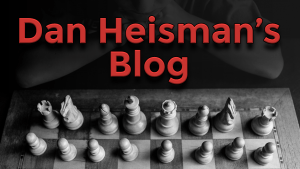Q&A with Coach Heisman May 24, 2013
Right after the show tonight my wife and I ran out for the 3-D showing of Star Trek: Into Darkness. It was a good movie - we've come a long way in portraying science fiction on the big screen. Ironically I started watching Star Trek about the same year I started playing tournament chess, 1966. The technology driving the science fiction movie matches the changes in the technology supporting chess - in 1966 there was no internet supporting Chess.com just as the 1966 Kirk could never be seen outside the ship nor could the Enterprise ever lose its artificial gravity, not matter how badly crippled. (There was also a trailer for Orson Scott Card's Ender's Game movie - at last! - but that's another game).
Questions for tonight's show again were strongly oriented toward how to improve at chess. I guess that's natural even if there are so many other interesting aspects of chess to discuss. It's also natural that many lower rated players are fascinated with opening choice and subtle strategies. In response to the concern about subtle strategies, I showed a recent position where a student had a basic choice in the endgame:
Black only has four legal moves but he has 17 minutes and a 45 second time delay to figure out what to do. With so little material on the board and such clear choices, it behooves Black to take whatever time is necessary to carefully analyze the outcome of all four legal moves, then choose the one(s) that give him the best chance.
In this case 1...Ka6 2.Kxc5 is a clear removal of the guard loss of the rook. 1...Kc6, the move which ostensibly guards the rook, loses to the skewer 2.Rc8+ followed by 3.Rxc5, winning. Only 1...Ka7 or 1...Kc7, intending to answer 2.Kxc5 with 2...Kxb8, and 2.Rxb5 with 2...Rxb5, are clear draws. That's not too difficult, but Black relatively quickly played 1...Ka6 and resigned after 2.Kxc5. When asked after the game why he did not play more slowly and find the draw, he responded that he had been ahead three pawns and was still upset with himself for throwing away the win - and thus he threw away the draw as well. There are several morals of the story:
1.No sense crying over spilt milk. Whatever caused Black to lose the earlier pawns could be examined after the game. Worrying about it during the game was costly. Anything which takes away from your ability to concentrate and find the best move you can in a reasonable time each move is counterproductive.
2. When you have lots of time remaining and only one or two critical moves left in the game, taking whatever time you need to ensure the maximum outcome. To play quickly and accept less is an error I call Acquiescing.
3. When students misplay the endgame like this, some vow "I will have to study endgames better" or complain "I don't know endgames." But I claim this type of endgame mistake has little to do with endgame study/knowledge and much to do with consistently taking your time to analyze carefully. The endgame is especially susceptible to analysis errors if you are not careful, since so many errors at that point can clearly let wins slip into draws and even losses, or draws into losses. Studying specific endgame situations like Lucena or Philidor won't help much in other endgame positions which, like this one, are not positions you can find in books and form the vast majority.
4. Earlier in the game, Black had made some important decision based on his fear of avoiding doubled pawns. But to worry about doubled pawns when you might play quickly and lose a rook in a relatively straightforward position is getting the "chess perspective" quite backwards. You have to be able to make the big safety decisions consistently before you should spend time worrying about the smaller, tiebreak ones. Strategy is usually the tiebreak of equally safe moves. My math analogy would be worrying about something in geometry before you know the next integer after 15 when counting to 20. I see this problem all the time, and it often comes from inexperienced players reading advanced grandmaster analysis and coming to the conclusion that they, too, need to implement those fine positional details if they are to improve. Better to work on the big issues like safety/tactics, playing consistently slowly in long time control games, and using all your pieces all the time (activity).
With that in mind I showed the beginning of the following game, which was played several years ago (the date is an estimate). White was a friend of mine rated 1500, who liked to play in the U2200 section of tournaments. In this game, which I think can be considered as a "poster game for positions where doubled pawns aren't always bad", he was paired with an expert, who had Black.
Around this point I walked away. When I returned a little later I found the game was over. The conversation went something like this:
Me: "How did you do?"
1500 Friend: "I got crushed."
Me: "Yes, I saw - things didn't look too good when I left."
1500 Friend: "But you know what was funny?"
Me: "No, what?"
1500 Friend: "I did everything right and he did everything wrong!"
Me: "Really? What do you mean?"
1500 Friend: "He had two sets of doubled pawns and I had none."
Me: "You really think that those doubled pawns were bad for him and good for you?"
1500 Friend: "Of course!"
Me: "Maybe I should get you to read my book Elements of Positional Evaluation where I discuss when doubled pawns can be harmful and helpful." 
I received many "Is X a good opening?" questions. In light of this happening on prior shows, I had written a Chess.com blog "What's a Good Opening?" I also quoted myself from p.133 of Alburt and Lawrence's Chess Rules of Thumb: "Any opening that you know well is good no matter what its reputation." And most of the openings about which I am asked have been played by grandmasters at one time or another (even if they are not the most popular opening) so they are quite acceptable. I did warn that if you did not look up your openings after a game to ask "If I had to play this game again where would I improve?" in a book or database, you are doomed to make the same mistakes over and over. And when asked about blitz, I wove this into the conversation, quoting and agreeing with Jen Shahade that if you don't look up the opening that occur in your blitz games after you play to learn those openings better, you are losing much of the blitz games' value.
One viewer phrased his question: "How is the Caro Kann?" Since I don't want the entire program to be deadly somber, I deadpanned, "Well, it has pneumonia and is in the hospital, but it should be better in a few days so that anyone can play it again."
Another brief humorous interlude involved a veiwer asking me if I worked out. It turned out I had been on the treadmill and exercise bike earlier in the day, but not exactly bench-pressing. This prompted another viewer to get upset, because apparently I had not seen his question (that happens when you only have 90 minutes and 200+ viewers asking questions), prompting him to post something like "This is ridiculous. He is answering questions about weighlifting and ignored my legitimate question. I'm outta here." When I saw this on the chat channel I apologized, but defended myself by stating that I did not skip any legitimate question I saw - I simply don't have time to see them all. In fact, at one point the channel got too full and was scrolling too fast, so one of the mods cleared the channel at a point where I was only about 30% thru the posted questions. The other 70% were thus lost, but I just continued with the new questions as they were posted on the cleared channel. Since I can't get to all the questions anyway, this only has the effect of slightly randomizing which ones I can respond to; but if yours was one of the ones deleted and you did not get a chance to re-post it, again I apologize but there's only so many questions I can answer in a show with many more viewers than minutes to answer their questions.
Someone asked about Nimzovich's My System. I acknowledged that it was a classic but, as IM John Watson wrote, "We are living in the golden age of chess books". There were not as many in Nimzovich's day, and he wrote a very wide work, in a witty style, and captured everyone's imagination. But today we have modern works that cover pretty much all of what Nimzovich addressed and, IMHO, possibly in a more instructive and pallatable manner. You might miss some of the clever wit, but you might also get a more modern - and possibly in some cases more objectively correct - spin on the issues from other works. It's all my opinion of course; you may have other views.
Another viewer asked me about Silman's excellent The Amateur's Mind. I responded that I liked the book, but did not recommend it until players reached about 1400 FIDE/USCF. As a prerequisite to The Amateur's Mind I suggested Coakley's Winning Chess Exercises for Kids. Don't be fooled by the title or the cover - this is a good introductory book for all ages. Coakley is an excellent writer and not everything he writes is either exclusively for kids or very basic (although this book is more on the basic side).
When I began the show, I was under the impression it was only for Diamond and Platinum members since I recall the previous show was for everyone. But when I logged on to test the video and audio, no one was on the Diamond/Platinum channel! Therefore, I switched to the "everyone" channel and there were the mods, waiting. So either I mis-remembered or someone switched this show to the "all" status and I did not get the word... I assume next one is Diamond/Platinum...?!
Some of the other references on the show included:
- Pawn Power in Chess - Kmoch (book)
- The World's Most Instructive Chess Book - Heisman (book)
- You Kids!
- The Dan Heisman Learning Center
- NM Aww-Rats Free Video Lessons
- Breaking A Slump
- Speeding Up
- Slowing Down
- Hand-Waving is Worse than Hope Chess
- Tactical Sets and Goals
- The Three Show Stoppers
- Getting the Edge
- Breaking Down Barriers






